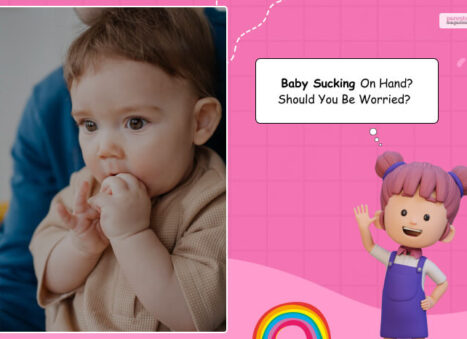
How Do I Know If My Baby Has a Tongue Tie: Signs & Symptoms
When a person is at a loss for words, or can’t point to the exact word they want to say, people say they have a tongue tie. However, it is also a physical condition that restricts talking, swallowing, eating, and other activities that you perform with your mouth.
So, if you identify that your baby has a tongue tie, it is best to resolve it before it hampers their development. All parents should be aware of a tongue tie or a lip tie. But parents often ask, How do I know if my baby has tongue tie?
Let’s check what the symptoms are that you should be looking for, and how you can treat those.
What is a Tongue Tie?

The frenulum is the part of the body that connects the lips and the tongue to the rest of the body. It is a soft tissue that feels like a cord. There are multiple frenula present in the mouth. Some are there in the cheek area, one for the bottom lip and one for the upper lip.
You can feel then when you move your tongue inside the mouth to the area above the front two teeth, or between the gums and lips. Another one you will find below the bottom front-most teeth.
You will find the other one below your tongue, and some you will find near the premolar or canine areas. When you have a frenula that is too tight, then you have a lip tie or a tongue tie. It restricts proper movement in the mouth and can impact health in different ways.
According to research more than 40% of people have a tongue tie. Some develop it from childhood with a moderately restricted frenulum. However, if a baby has a tongue tie, it can cause them some serious issues.
If the lingual frenulum is too tight, meaning the one under the tongue, then your baby will find it difficult to breathe, speak, drink, and eat. One of the biggest problems is that you will they will have trouble with bottle-feeding and breastfeeding.
If the buccal frenum or the ones that you have on your cheeks and under the lips are too tight, then it will impact the dental health of the child. This call pulls at the gums and exposes the teeth’ roots.
It will strongly impact how well your baby can latch at the breasts and this can cause an open mouth posture, which is an unhealthy breathing pattern.
Why is Tongue Tie a Big Deal?

One of the main reasons behind getting concerned about tongue ties is that it impacts the growth and development of the jaw. The tongue’s ability to move to the palate expands the jawbone.
This makes room for the teet, allows them to breathe and sleep better. Jaw growth happens early in the time and more than 75% of is done by the time your child is 6. If you can identify the tongue ties early, there is a chance that you will get to treat those better.
How do I Know If My Baby Has a Tongue Tie: Signs & Symptoms

If a baby is suffering from lip ties or tongue ties, they will not be able to use their mouth. These are some of the symptoms that you will notice:
- Difficulty in latching on bottle or breast
- Pain in breastfeeding
- Getting irritated while breastfeeding
- Poor weight gain
- Not being able to seal properly
- Choking, gasping, or gulping at the breast
- Clicking, chewing, and gumming nipples
- Unable to flange their lips
- White coating on tongue
Complications That Come With Tongue Tie

Tongue tie affects the oral development of the baby and the way your child is eating, speaking, and swallowing. The complications your child will face are mentioned below.
Breastfeeding Problems
During breastfeeding, your baby will have to keep their tongue over the lower gum when they are sucking. If they are unable to move their toingue or keep it in position, they might chew on the nipple insted of sucking.
This can cause you pain in the nipples and interfere with your ability to have breast milk. Moreover, it can turn out to be an obstacle and lead to inadequate nutrition.
Speech Difficulty
Tongue ties interfere with their ability to make a few sounds like “I”, “t”, “s”, “d,” “th”, and “n.”
Challenges With Oral Activities
Tongue ties can interfere with different activities like licking and kissing. Growing up they will find it difficult playing a wind instrument.
Treatment for Tongue Ties In Babies

There are various ways a healthcare provider manages a tongue tie. Those are:
- Healthcare providers help you with the breastfeeding position and latch. This helps many tongue-tied babies with breastfeeding. The lactation consultant will support you through eery step and will asses the progress and follow up with you.
- In certain cases, doctors do a procedure. They clip the lingual frenulum under their tongue to help it move more freely inside their mouth.
Wrapping Up!
The first few months in the baby’s life are full of surprises. You will discover a lot of things during this time. Moreover, if you are thinking how do I know if my baby has a tongue tie, now you have the answer to it.
One of the first signs of tongue tie you will notice is when you are having trouble breastfeeding your baby. However, this is not the only one. If you are finding it difficult to feed your baby, consult a doctor immediately.
Already have an account?
Sign In
Create your account
User added successfully. Log in









